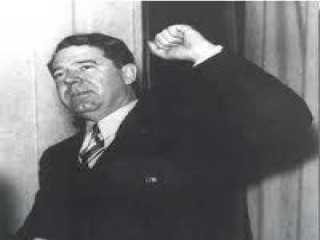
Huey Pierce Long biography
Date of birth : 1893-08-30
Date of death : 1935-09-08
Birthplace : Winnfield, Louisiana, U.S.
Nationality : American
Category : Politics
Last modified : 2011-06-24
Credited as : Politician, Governor of Louisiana,
The seventh of nine children, Huey Long was born on Aug. 30, 1893, in Winnfield, a poor parish in Louisiana. Huey toiled on the farm until he was 13. He excelled as a school debater and read widely in the Bible, Shakespeare, and Victor Hugo. He worked as a typesetter and an itinerant salesman and briefly attended the University of Oklahoma. In 1913 Long married Rose McConnell, and he soon enrolled in the Tulane University Law School. After 7 months of study he was admitted to the bar.
Long established his law practice in Winnfield. Within 6 months he was elected to the state railroad commission. Cultivating a reputation as champion of the common people, he successfully attacked the utilities industries and the privileges of corporations. In 1928, after his earlier unsuccessful bid, Louisiana voters elected him governor by the largest margin in the state's history.
Long's beliefs were conditioned by his environment. Winnfield parish historically had fostered political dissent. Its residents had voted against secession in 1861, refused to fight for the planter aristocracy, and staunchly endorsed the Populist movement of the late 19th century. Unlike other southern politicians, Long did not use the Confederate legend in his speeches and rarely indulged in race baiting. He brought a realism to southern politics by focusing upon the social and economic ills of the common people.
A shrewd lawyer, Long tried to give the impression of being ignorant. Yet he approached politics as a power game and, like other Louisianians, accepted corruption as necessary to political life. He condemned the state's ruling hierarchy of planters and business groups and the New Orleans big-city political machine as an elite. He became the first southern leader of the masses to set out, not to bring the established machine to terms, but to replace it with his own.
Political leaders of the 1930s accused Long of being a dictator. Indeed, although he gave Louisiana badly needed reforms, he also flouted the processes of parliamentary democracy. However, T. Harry Williams, his biographer, views Long as within the tradition of American bossism. Williams states that Long possessed the qualities of the mass leader as described by political analysts. Besides audacity and single-mindedness, Long brought an abnormal, combative energy to his tasks. He knew which enemies to destroy and which to retain as symbols of the continuing evil against which he fought.
The basis of Long's political machine was patronage, but in the final analysis his triumph was ensured by his ability to deliver on his promises. Under Long the state actually improved the lot of the common people. Between 1928 and 1935 it constructed a modern highway system, provided free school textbooks, increased appropriations for the state university, and offered free nightschool courses for adult illiterates of both races. It also enlarged and modernized state hospitals and institutions. The money for this far-reaching social program came partly from increased taxes, bearing largely on corporate interests, but mostly from bonds and increased state indebtedness. In the process, Long revitalized state politics. He created a new political consciousness among the masses and gave Louisianians a Democratic party exhibiting many of the attributes of a two-party system.
Facing a hostile legislature, Long jammed through several valuable bills. But his lobbying tactics, raids on gambling houses, and building of a personal political machine alienated him from the ruling oligarchy and regular Democrats. Their hostility peaked when Long summoned a special session of the legislature to enact a tax on the oil industry. The House threw out the bill and impeached the governor. But the Senate failed to convict by two votes, and the matter was dropped amid accusations that Long had bribed legislators.
Fresh from this victory, Long announced his candidacy for the U.S. Senate. He was elected in 1930. He refused, however, to surrender the gubernatorial post to his lieutenant governor, who was an avowed political enemy. Summoning the national guard, Long installed Alvin O. King, president of the state senate, to act as governor. In fact, it was during his senatorial period that Long extended his power structure in Louisiana to its widest limits. He returned to Louisiana in 1934, convened a special session of the legislature, and pushed through bills placing the electoral machinery in the governor's hands, outlawing interference by the courts with his use of national guardsmen, and creating a secret police. He followed with a crackdown on New Orleans gambling places and nightclubs.
Always the flamboyant and active senator (though one whose name was not perpetuated by important legislation), Long served a period in Washington that coincided with the first presidential administration of Franklin D. Roosevelt. In 1932 Long disclosed his "Share Our Wealth" program, whereby the government would limit the income of all citizens through taxation. He quickly found flaws in Roosevelt's New Deal program and was soon in open revolt. More important than ideology was the fact that Roosevelt stood in the way of Long's national ambitions. In 1934 Long broke with the President and demanded that the Federal government furnish every family with a $5, 000 allowance and an annual income of $2, 000 plus benefits. Roosevelt responded by denying Long Federal patronage in Louisiana.
At the time of his death, Long was preparing to curtail New Deal programs in Louisiana drastically and was moving, with right-wing leader Father Charles Coughlin, toward a third-party challenge to the President. The "Kingfish" was assassinated in Baton Rouge on Sept. 8, 1935, by a political foe.
















